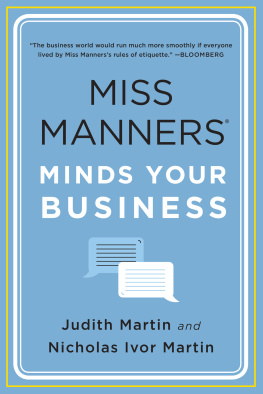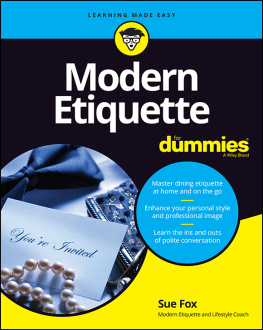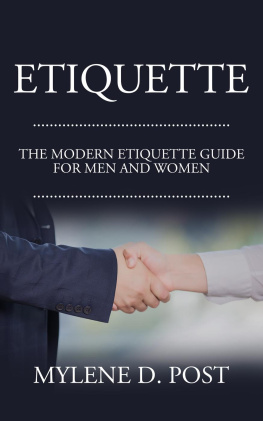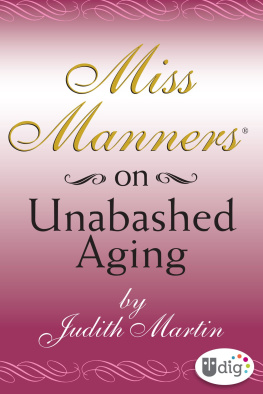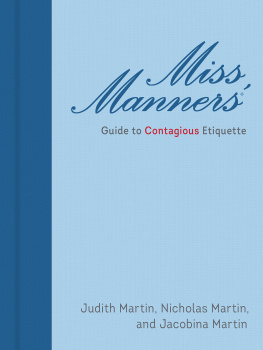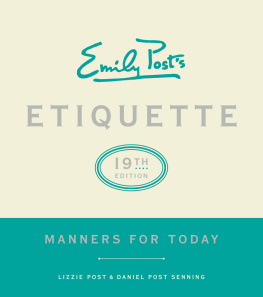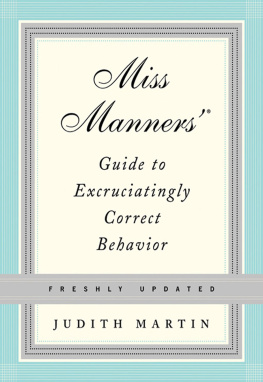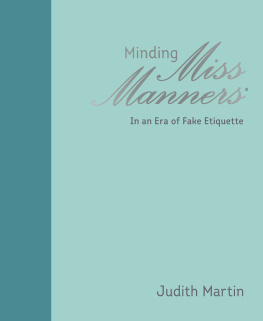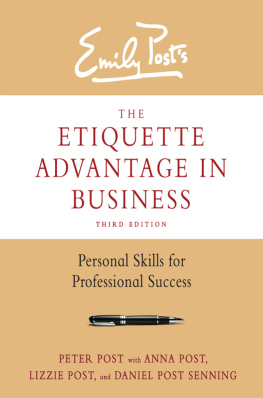
ALSO BY JUDITH MARTIN
Miss Manners Guide to a Surprisingly Dignified Wedding
No Vulgar Hotel: The Desire and Pursuit of Venice
Miss Manners Guide to Excruciatingly Correct Behavior (Freshly Updated)
Star-Spangled Manners
Miss Manners Guide to Domestic Tranquility
Miss Manners Basic Training: The Right Thing to Say
Miss Manners Basic Training: Eating
Miss Manners Basic Training: Communication
Miss Manners on Weddings
Miss Manners Rescues Civilization
Miss Manners Guide for the Turn-of-the-Millennium
Common Courtesy
Style and Substance
Gilbert: A Comedy of Manners
Miss Manners Guide to Rearing Perfect Children
Miss Manners Guide to Excruciatingly Correct Behavior
ALSO BY NICHOLAS IVOR MARTIN
The Da Capo Opera Manual
Miss Manners
MINDS YOUR
BUSINESS
__________________
JUDITH MARTIN
and
NICHOLAS IVOR MARTIN
__________________

W. W. NORTON & COMPANY New York London
Copyright 2013 by Judith Martin and Nicholas Ivor Martin
All rights reserved
First published as a Norton paperback 2014
For information about permission to reproduce selections from this book, write to Permissions, W. W. Norton & Company, Inc., 500 Fifth Avenue, New York, NY 10110
For information about special discounts for bulk purchases, please contact W. W. Norton Special Sales at specialsales@wwnorton.com or 800-233-4830
Book design by Dana Sloan
Production manager: Louise Mattarelliano
The Library of Congress has cataloged the printed edition as follows:
Martin, Judith, 1938
Miss Manners minds your business / Judith Martin and Nicholas Ivor Martin.
First edition.
pages cm
Includes index.
ISBN 978-0-393-08136-7 (hardcover)
1. Business etiquette. I. Martin, Nicholas Ivor. II. Title.
HF5389.M3755 2013
395.5'2dc23
2013012065
ISBN 978-0-393-24146-4 (e-book)
ISBN 978-0-393-34985-6 pbk.
W. W. Norton & Company, Inc.
500 Fifth Avenue, New York, N.Y. 10110
www.wwnorton.com
W. W. Norton & Company Ltd.
Castle House, 75/76 Wells Street, London W1T 3QT
For Robert and Rebecca,
August and Greta
Contents
David Hendins brilliance and generous attention to two generations of Martins has made this and every other Miss Manners enterprise not only possible, but delightful.
The authors are also grateful to Angela von der Lippe and to Kimberley Heatherington.
H ow is your business any of Miss Manners business?
Her own business model is founded on the hope of putting herself out of business. Perhaps your professional goal is different, but nothing would make her happier than to wake up one morning to a world in which her modest advice had been so absorbed that it required no further reinforcement. The porch swing beckons.
Alas. Her correspondence of late has convinced her that all you busy people out there are not solving your problems on your ownyou are making them worse.
Its a wonder any work gets done, because, as the junior people explain, all the burden is on them, while their seniors are preoccupied with their pretentious social standing and their golf games. The senior staff complains of having to carry their juniors, who keep being distracted by their chaotic social arrangements, their awful music, and their violent video games.
Supervisors report that their employees dont practice the most basic manners, and that job applicants are worse. Workers report being treated with disrespect by their supervisors, and applicants report being ignored, not only when they apply, but even after being interviewed.
Customers report that clerks ignore or pressure them and clerks complain that customers yell and curse them. Employers report that employees are always goofing off during work hours and employees report that employers expect them to attend company functions in their free time.
If there is a professional dress code, some people are indignant because it inhibits their freedom of self-expression. If there is a casual dress standard, some people are indignant because of the free and uninhibited way others express themselves. If there is a speech code, some declare it is too weak to be of use and some that it stifles creativity or honesty or morale.
The old business luncheon is still an expected part of successful professional life, even though the martinis and the hat-check girls have long gone their separateor possibly jointways. For those who have always gotten their sustenance straight from the refrigerator or the food court and have never actually sat down to a meal in company, having to go out and eat with a job interviewer, colleagues, or clients is a crisis.
If the younger generation cant eat, the older generation cant tweet. New fashions and new technologies continue to increase the list of required professional skills. Bosses who thought that sensitivity was for girls learned to navigate weekend retreats and touchy-feely seminars without being brought up on charges. When their secretaries were replaced by computers, the smarter ones accepted the unavoidable humiliation of being lectured to by a contemptuous teenager from the computer help desk. And thenhaving learned the hard way the results of pressing send on every angry emailthey were asked to post blogs filled with chummy and pithy observations about the company that seemed spontaneous and intimate without sending the legal department into hysterics.
All these problems are symptomatic of wider cultural confusion that has left the workplace riddled with etiquette land mines. Whether you blame resistance to relaxing the old rigidity of behavior or ignorance of traditional businesslike behavior, everybodynot only between junior and senior groups, but within them as wellseems to be getting on everybody elses nerves.
Remember the good old days, when people just went about their business without all this irritation? No, you dont really. You werent even there. Miss Manners, who was, assures you that the good old days had worse etiquette problems.
The rote courtesy that you imagine was then practiced was directed only toward self-designated gentlemen. Ladies, along with blacks, gays, and the disabled, were either excluded or exploited, a moral sin that led, as such things often do, to grievous manners sins.
When on the job, they, along with other underlings, were not accorded the respect they were supposed to show. For example, they were addressed by their first names, as if they were children, or called boys or girls by people whom they were expected to address using honorifics and surnames. If they objected to what we now call sexual harassment (then known as fun) or bigotry, they were at best branded as having no sense of humor. More likely, they suffered the consequences of being identified as troublemakers.
Victims of that callousness are still around. Miss Manners wonders how they feel when total strangers address them in the old condescending way, under the pretense of friendliness.
At least the dress code was clear in the old days. Yes, and such items as jackets, ties, and nylon stockings were worn through scorching summers in non-air-conditioned offices. Those people looked professional right up until the moment they keeled over.
What you probably miss is the professional demeanor they were expected to maintain. Clerks did not make customers wait until they had finished their personal telephone calls. Waiters did not introduce themselves. Customer service representatives answered the telephone.
Next page
